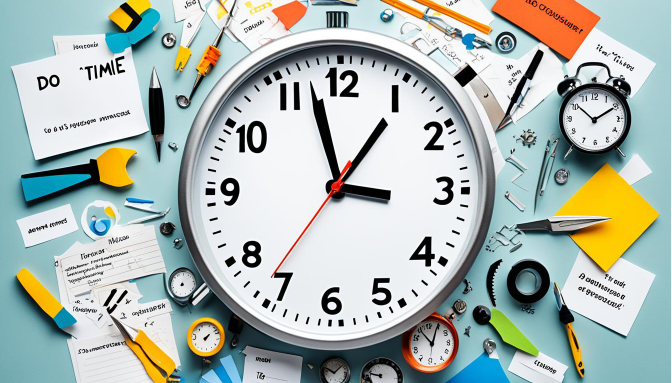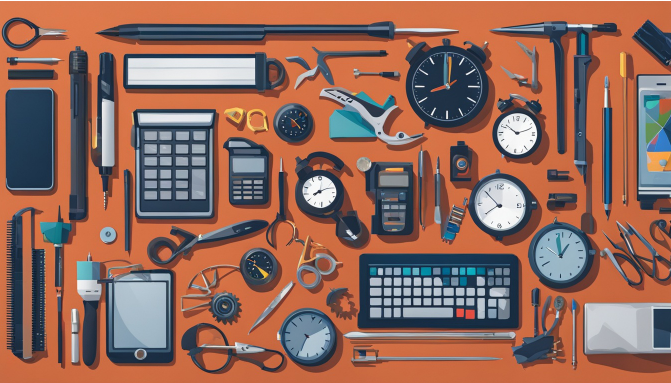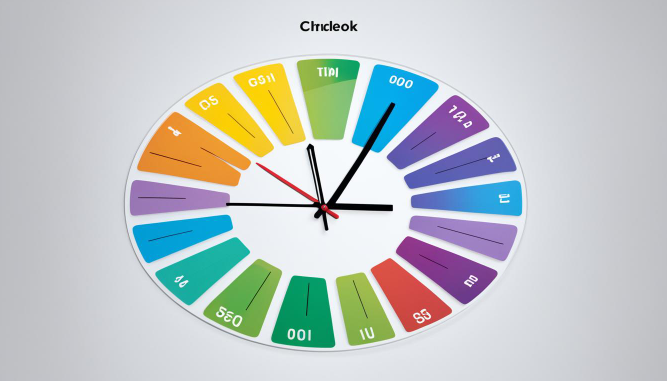In today’s quick work world, time management is key. It boosts productivity and helps with personal growth. A study shows the average Brit wastes two hours and 11 minutes a day at work. Also, 36 percent of millennials use more than two hours a day on their phones at work. This shows we need to find better ways to manage our time.
The Time Management Self-Assessment Questionnaire is a great tool. It has 52 questions to help you think about how you manage time. It focuses on prioritizing, staying organized, and not letting distractions win. Gloria Mark, a Professor at the University of California, found it takes 23 minutes and 15 seconds to get back to work after a distraction. This shows how much interruptions can slow us down.
This assessment helps you look at your time management skills. It asks questions to see what you’re good at and what needs work. By doing this, you can make goals to get better at your job. Goal setting is crucial as it helps prioritize tasks and avoid being overwhelmed by competing responsibilities. This helps you work better and grow, which gets you ready for performance reviews.
Introduction to Time Management Self-Assessment
Time management is about planning your time well. It helps you divide your time for different tasks. Doing a self-assessment can show how well you handle your time. This helps find what takes up too much of your time.
It’s key to understand good time management. This is important for keeping a balance. You need this balance for school, work, and your personal life.
Looking at your daily habits is part of a self-assessment. For example, 54% always make a list of things to do each day. 38% make a daily plan. These tips help you check how productive you are. Scheduling your tasks can prioritize them, reduce stress, and keep you focused on your Q2 activities. They also help you understand yourself better.
According to studies, 62% always make a work schedule. And 73% plan each day. These are important steps for managing time well. But, 66% find it hard to say “No” to people. This can cause problems with tasks like schoolwork. It’s vital to learn how to set and keep your main goals.
By doing a time management self-assessment, you can find out your best times to work. Activity 1, a 15-minute self-assessment, lets you check your daily routines. Other activities help you plan better and stay organized.
Using self-analysis and checking your productivity helps you control your time better. A big number, 69%, feels they control their time well. This shows that knowing yourself and your time helps in managing it.
Why Time Management Matters
Learning to manage time well is key in all stages of life. Whether you’re in school or working, it’s important. For those in college, waiting until exam time to study is a mistake many make. This shows why learning time management early is so crucial. When you start working, you’ll find time management skills are even more essential.
Being successful with time management starts with managing yourself. It means being disciplined and sticking to a flexible but well-planned schedule. When you set clear goals, you’ll improve your effectiveness and get more done right. This increases how productive you are.
It’s necessary to use the right techniques to manage yourself and your time well. This leads to a more balanced life. It’s important to be able to adjust your plans when things change. But, try not to switch between tasks too often. It usually slows you down.
Setting deadlines can really get you moving. They not only push you to act, but they also make you more productive. Also, taking care of yourself is crucial. Things like getting enough sleep, taking breaks, eating well, and staying active are key. They help you stay in a good mood and focus better.
Don’t forget about Parkinson’s Law. This law shows that work usually fills the time you give it. By setting deadlines, you make tasks more doable. This makes you work more efficiently. Managing your time means you organize, prioritize, and plan. It leads to getting things done faster, growing personally, and staying healthy and happy.
It’s important to balance everything in your life. Like, not getting enough sleep can really hurt how much you get done. Good time management boosts your productivity and makes your life more balanced. This means less stress, more personal time, fewer distractions, and a more satisfying life. It also helps you care for yourself better and avoid procrastination. This makes you feel more energetic and confident. Overall, it helps improve your life in many ways.
Key Objectives and Achievements
Self-evaluations help us grow. They make us think about what we’ve done. They also push us to do better. This helps us get to know ourselves. It makes us better team players and friends. We will talk about looking back on our goals. We will see how well we did and what we learned.
Reflecting on Past Goals
Looking back at old goals shows our progress. We see what we’ve done. We understand how we’ve helped others. This makes us proud of ourselves. It also makes us appreciate our skills.
Performance Rating
Rating our own work is key. It connects us with our team’s goals. We look at what we’ve added. And we find ways to do more. This way, we grow. And we move towards the job we want.
Understanding Your Productive Times
Knowing when you work best is key to managing your time wisely. Keeping a time journal, where you record what you do every 15 minutes, is a great way to see when you’re most productive. By looking at this time journal, you can figure out when you get the most done. This helps you plan to tackle your hardest tasks during these times.
Being aware of your best work times lets you make a schedule that fits those times. For example, doing important tasks when you’re most alert helps you work better and feel less stressed. You can also see how much time you spend on work, family, fun, and meetings. This gives you clues on how to improve the way you manage your time.
Also, planning your work around your personal best work times helps you finish important tasks quickly and well. Using techniques like the Pomodoro method, where you work for 25 minutes and then take a short break, can also really help. It keeps you focused and less tired, using your most productive times to do your best work.
Time Management Strategies
Good time management helps us do more and reach our goals. By using tools and methods to prioritize, we can control our schedules. This way, we do our tasks better and more quickly. Essential parts of managing time well include planning, finding smarter ways to work, and the ability to adjust. It is crucial to develop skills and strategies that enhance our ability to manage time effectively.
Setting Priorities
Knowing what to do first is key. We should focus on things that are both urgent and important. This makes sure our effort goes where it’s needed most. It’s wise to plan out study goals and check our progress regularly. It keeps us on track and efficient.
A to-do list based on priorities is a great tool. It helps us think about how we work and improve our methods. Plus, it ensures we’re always working on the most important tasks.
Finding the best time for different tasks is important. This could mean doing harder tasks when we have the most energy. Also, being able to change our plans quickly when issues come up is crucial. This kind of flexibility makes our schedules stronger and work more smoothly.
Use of Planning Tools
Tools like planners and apps can really help with organizing our time. They let us keep an eye on our tasks and plan better. It’s also key to regularly look at how we work to stay focused and motivated. SMART goals are a great way to do this. They help us measure our progress and keep moving forward.
Getting feedback on our time management is also very useful. Regular checks and reviews (daily, weekly, etc.) can help us spot areas for improvement. They’re great for sticking to our goals, dealing with distractions, and growing our time skills. These steps lead to better management of our time and higher productivity.
Behavior and Values in Time Management
How we act and what we believe affect how we manage our time. Thinking about what matters to us and how we use our time is key. The matrix by Dwight D. Eisenhower and Stephen Covey helps us sort tasks and do what’s most important.
The matrix puts tasks in four groups: urgent and important (Quadrant 1), important but not urgent (Quadrant 2), urgent but not important (Quadrant 3), and neither urgent nor important (Quadrant 4). It teaches us to focus on what’s truly important, not just what seems urgent.
We need to look at how our time use affects our life. This means figuring out what we’ve done, what we want to do, and where we can do better. It helps us know ourselves better and take charge of our promises. This way, not only do we grow, but we also become better at working with others and earning their trust.
Many people waste time online or delay work. For example, the average Brit puts off work for over two hours a day. Also, 36% of young adults use their phones for two hours or more at work every day. These facts show why it’s important to avoid time-wasting and focus on what truly matters, as the matrix teaches.
If we follow good time management and think regularly about our values, we’ll be more efficient and disciplined. Doing this is crucial for anyone wanting to use their time better and do well in their daily tasks.
Growth and Development Questions
It’s key to ask about growth and development. By looking at past wins and future goals, we get where to improve. Doing this before talking to our bosses helps make our goals doable.
Areas for Improvement
For getting better, workers should look at what they need to change. Answering self-review questions helps find what to work on. A tool called Start/Stop/Continue makes this easier. It points people toward their strengths and what needs work. Plus, getting feedback often can lower leaving a job by 15%.
Professional Growth
A growth mindset helps everyone get better at work. People who grade themselves take the lead in their job progress. This keeps them interested and working well. Gallup found only 2 out of 10 workers are pushed to do their best. Asking questions about their work and goals can really help them aim high.
Self-reviews also let people outline their goals. This makes the workplace a spot for always getting better. Everyone feels both happy and ready to grow. So, work turns into something more lively and successful.
Challenges and Obstacles
It’s important to understand and face challenges in managing time. These problems can really hurt how much work we get done each day. Overcoming them means finding what’s stopping you and then figuring out how to fix it.
Did you know, only 20% of people feel they control their time at work? That’s because 80% of their day is spent on things that don’t really matter. To do better, look at how often you finish tasks on time and how much you get distracted. Then, you can see where you need to improve.
To get better at managing time, you need to see how well you’re doing now. For example, if you score 30-44 on a test, you’re doing okay but not great. Scores below 29 mean you have a lot of work to do. Take a time management self-assessment to see where you stand and what you need to work on.
Problems can be solved with the right techniques in time management. Look at your day, pick what’s most important, and try to avoid getting sidetracked. It’s been proven that planning helps people feel happier about how they use their time. If you score between 90 and 124 on a test, you’re doing pretty good. But there’s always room to get even better. People scoring lower should find their weak spots and try to improve there.
Self-assessment tools are useful for getting better at managing your time. They help you keep track of what needs to get done first. This way, you can deal with problems and do your job better.
Companies can also help by cutting out the time spent on tasks that don’t matter much. They can check in regularly and make plans to fix problems. If you need help specific to your job, looking at a time management skills assessment can give you a clearer picture.
Self-Motivation and Discipline
Self-motivation and discipline are key to managing time well. It’s like making a muscle stronger with each exercise. You start by setting small tasks. Then, you move to bigger ones as you get better at this.
Handling Distractions
Keeping focused means fighting distractions. To stay sharp, people in time management training learn to balance work and personal life. They also learn to let go of tasks that can wait.
It’s not good to be too strict. This can add stress and make you less productive. So, it’s okay to take breaks and accept when things don’t go as planned.
Avoiding Procrastination
Procrastination is a big hurdle to self-discipline. To overcome procrastination, you should put the most important things first. Include rewards for when you finish tasks on time.
Using tools like time management software can also really help. The trick is to follow a daily plan. This keeps you on track and fighting off bad habits. Achieving daily goals is vital, especially during the pandemic, to keep motivated and disciplined.
Time Management Self-Assessment
The time management self-assessment helps people look at how they use their time. It’s made to make us think about our past actions and set new goals. By doing this, we can find and fix things to make our lives better, both at work and in our personal time. There are 25 statements in the assessment. They cover things like how we work, use email, and plan our days.
You score each statement from 1 to 5. This shows how well you manage your time. A perfect score of 125 means you’re a time management pro. Scores between 90 to 124 show you’re doing very well. But, less than 90 means you need to work harder. We use this scoring system to see if someone is good, needs some work, or really needs to improve their time skills.
Looking at everyone’s scores together, we see how good the group is at managing time. When we look at how often someone does something—always, sometimes, never—we learn a lot. This helps us see what’s common and find patterns. Then, we can see how better time skills lead to more achievements and less stress.
This «personal time audit» helps us understand the link between what we do, when we do it, and how well we manage our time. Planning ahead is super important for using time well. Keeping tasks updated and balancing work with fun helps us use time wisely. Knowing when we work best on important tasks helps us get more done.
Using self-assessment tools, we can work on getting better at certain things. We should keep checking on our progress. This way, we get better slowly but surely. It also helps to think about how we use our time for fun versus school stuff. And knowing what slows us down from being on time helps a lot.
Conclusion
Conducting a time management review is key. It helps us see how we use our time.
This process lets us find ways to get more done. We can see what helps us work better and what doesn’t.
Breaking down tasks by how important and urgent they are is a great start. Planners and calendars really come in handy here. They help keep our tasks organized.
To fight off procrastination, start with the hard stuff first. Also, limit how often you check emails or get notifications.
It’s good to see when you work best and keep that time free from any interruptions. Knowing yourself well makes it easier to do your best.
Sharing tasks and managing stress are also important. They help us handle work and life better. Following these steps improves our choices and how we talk with others.
FAQ
What is a time management self-assessment?
A time management self-assessment lets us look at how we use our time. We think about what we do, what takes up our time, and how productive we are. This reflection helps to do better and achieve more.
Why is it important to conduct a time management self-assessment?
It’s important to check on how we manage time to understand our work better. This check can reduce stress and help find a life balance. It makes reaching our goals easier.
How do I reflect on my past goals during a self-assessment?
Think about the goals you’ve set and what you’ve accomplished. Remember things you did well and challenges you faced. This helps see what you’re good at and what you can improve on. It guides setting new goals.
How can I determine my most productive times?
Keep a log of your daily tasks and how you feel. Look back at this info to find when you work best. Use this insight to tackle tough tasks at your peak times.
What strategies can I use for effective time management?
To manage time well, know what’s urgent, what’s important, and what can wait. Work with clear priorities. Use tools like planners or apps to plan your days. This makes sure you focus on what matters and doesn’t miss deadlines.
How do my personal values affect my time management practices?
Your values shape what you focus on and commit to. Thinking about if your actions match your values helps stay on track. It keeps you motivated and effective.
What questions should I ask for professional growth and development?
Think about what skills need improving and how to use your strong points more effectively. Consider unlocking new abilities too. These questions support personal growth and help you advance.
How can I overcome challenges and obstacles in time management?
Beat time management issues by spotting and fixing what’s wasting your time. Find ways to cope and solve problems. This strategy lets you handle challenges head-on.
What are some tips for handling distractions and avoiding procrastination?
Create a space that helps you focus and set limits on distractions. The Pomodoro Technique can help with staying on task. Also, plan tasks in small parts, set deadlines, and reward yourself for meeting them.
What tools can help with a time management self-assessment?
Tools like planners, calendars, and apps can be very helpful. They help organize your time and show where you can do better. These tools offer insights into your time habits and how you can improve them.

More Posts
Top 10 Tips for Teachers to Develop a Weekly Lesson Plan
Creating a weekly lesson plan is key for keeping the classroom organized. It helps make sure students meet their learning goals. Planning lessons doesn't have to take up all your time. By looking...
How to Handle Repetitive Tasks - 8 Tips
Research shows a lot of us spend 20% of our work week on boring tasks. This can hurt our productivity, morale, and stress levels. It’s important to manage tasks well to be efficient...
13 Ways Successful CEOs Manage Their Time
CEOs tackle big challenges that need great time skills to manage many roles. Studies by Harvard Business School experts like Michael E. Porter and Nitin Nohria show CEOs work around 62.5 hours every...
12 Effective Strategies to be Productive and Overcome Creative Blocks
Creative blocks stop many professionals in their tracks. They make it hard to think of new ideas. Knowing how to fight these blocks is key to keeping creativity alive. Things like weather and...



